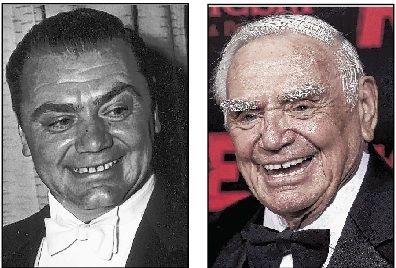LOS ANGELES – Ernest Borgnine was a tubby tough guy with a pug of a mug, as unlikely a big-screen star or a romantic lead as could be imagined.
Yet he won a woman’s love and an Academy Award in one of the great lonelyhearts roles in “Marty,” a highlight in a workhorse career that spanned nearly seven decades and more than 200 film and television parts.
Borgnine, who died Sunday at 95, worked to the end. One of his final roles was a bit part as a CIA records-keeper in 2011’s action comedy “Red” — fittingly for his age, a story of retired spies who show that it’s never too late to remain in the game when they’re pulled back into action.
“I keep telling myself, ‘Damn it, you gotta go to work,’” Borgnine said in 2007. “But there aren’t many people who want to put Borgnine to work these days. They keep asking, ‘Is he still alive?’“
Yet people kept him working all the way through modern times, when he had a recurring voice role on “SpongeBob SquarePants,” became the oldest actor nominated for a Golden Globe and received the lifetime-achievement award last year from the Screen Actors Guild.
He died of renal failure at Cedars-Sinai Medical Center with his wife and children at his side, said spokesman Harry Flynn.
Borgnine was cast as heavies early on, notably as Sgt. Fatso Judson, the brute who beat Frank Sinatra’s character to death in 1953’s “From Here to Eternity.”
But Borgnine showed his true pussycat colors as lovesick Marty Piletti, a Bronx butcher who finds romance with a wallflower in “Marty,” adapted from Paddy Chayefsky’s television play. Borgnine won the best-actor Oscar, and the film picked up three other awards, including best picture.
“You don’t have to be tall, dark and handsome to be a movie star,” Borgnine said after winning the Oscar, “but I was the first one to prove it.”
After “Marty,” the veteran sailor’s most memorable character appropriately came with the title role of the 1960s TV comedy “McHale’s Navy” and its big-screen spinoff.
Mischievous con man McHale, commander of a World War II PT boat manned by misfits and malcontents, was far closer in spirit than shy Marty or savage Fatso to the real Borgnine, who had a reputation as a prankster.
He was playing another nasty character opposite Spencer Tracy in “Bad Day at Black Rock” when he auditioned for “Marty.”
Chayefsky and “Marty” director Delbert Mann had hoped to cast Rod Steiger, who played the lead in the TV version of “Marty,” but he had just landed a part Borgnine himself coveted — the bad guy Jud Fry in “Oklahoma!”
“Marty” charmed audiences who saw for the first time that Borgnine could play the teddy bear as well as the beast.
No one knew Borgnine could act at all until he came home from World War II after a 10-year Navy stint. He enlisted in 1935, was discharged in 1941, then re-enlisted when the war began, serving on a destroyer.
As he contemplated what to do after the war, Borgnine’s mother suggested acting.
“She said, ‘You always like getting in front of people and making a fool of yourself, why don’t you give it a try?’” Borgnine recalled last year, shortly before receiving his SAG lifetime honor. “I was sitting at the kitchen table and I saw this light. No kidding. It sounds crazy. And 10 years later, I had Grace Kelly handing me an Academy Award.”
“Marty” made his career, but the success also brought complications for Borgnine.
“The Oscar made me a star, and I’m grateful,” Borgnine said in 1966. “But I feel had I not won the Oscar I wouldn’t have gotten into the messes I did in my personal life.”
Those messes included four failed marriages, including one in 1964 to singer Ethel Merman.
He told the British Film Institute that the marriage collapsed during their Hawaii honeymoon when people recognized him but not her. “By the time we got home it was hell on earth,” he said. “And after 32 days I said to her, ‘Madam. Bye.’ “
But Borgnine’s fifth marriage, in 1973 to Tova Traesnaes, endured and brought with it a business partnership. She made and sold her own beauty products and used her husband’s rejuvenated face in her ads.
In 2007, Borgnine complained that he wanted to continue acting but roles were tough to find at his age.
“I just want to do more work,” he said. “Every time I step in front of a camera I feel young again. I really do. It keeps your mind active and it keeps you going.”
— The Washington Post contributed to this report.
Send questions/comments to the editors.


